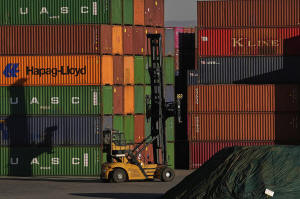US tariffs put 30,000 South African jobs at risk, officials say
[August 05, 2025] By
MICHELLE GUMEDE
JOHANNESBURG (AP) — United States reciprocal tariffs have put an
estimated 30,000 jobs at risk, South African authorities said Monday,
four days before a 30% U.S. tariff on most imports from South Africa
kicks in.
South Africa was slapped with one of the highest tariff rates by its
third-largest trading partner — after the European Union and China —
creating uncertainty for the future of some export industries and
catapulting a scramble for new markets outside the U.S. The tariff rates
come into effect on Aug. 8.
In an update on mitigation measures, a senior government official warned
that an estimated 30,000 jobs were in jeopardy if the response to the
higher tariffs was “mismanaged."
“We base this on the ongoing consultations that we have with all the
sectors of the economy from automotive, agriculture and all the other
sectors that are going to be impacted,” said Simphiwe Hamilton,
director-general of the Department of Trade, Industry and Competition.
South Africa is already grappling with stubbornly high unemployment
rates. The official rate was 32.9% in the first quarter of 2025
according to StatsSA, the national statistical agency, while the youth
unemployment rate increased from 44.6% in the fourth quarter of 2024 to
46.1% in the first quarter of 2025.
In his weekly online letter to the nation on Monday, President Cyril
Ramaphosa said that South Africa must adapt swiftly to the tariffs since
they could have a big impact on the economy, the industries that rely
heavily on exports to the U.S., and the workers they employ.
“As government, we have been engaging the United States to enhance
mutually beneficial trade and investment relations. All channels of
communication remain open to engage with the US,” he said.

“Our foremost priority is protecting our export industries. We will
continue to engage the US in an attempt to preserve market access for
our products.”
President Donald Trump has been highly critical of the country’s
Black-led government over a new land law he claims discriminates against
white people.
Negotiations have been complicated and unprecedented, according to South
Africa's ministers, who denied reports that the lack of an ambassador in
the U.S. affected the result of the talks. The Trump administration
expelled Ebrahim Rasool, South Africa’s ambassador to Washington, in
mid-March, accusing him of being a “race-baiting politician” who hates
Trump.
[to top of second column] |

A heavy machine drives past shipping containers stacked at a depo,
in Johannesburg, South Africa, Friday, Aug. 1, 2025. (AP Photo/Themba
Hadebe)
 International Relations Minister
Ronald Lamola highlighted that even countries with ambassadors in
the U.S. and allies of Washington had been hard hit with tariffs.
However, Lamola confirmed that the process of appointing a
replacement for Rasool was “at an advanced stage”.
The U.S. accounts for 7.5% of South Africa’s global
exports. However, several sectors, accounting for 35% of exports to
the U.S., remain exempt from the tariffs. These include copper,
pharmaceuticals, semiconductors, lumber products, certain critical
minerals, stainless steel scrap and energy products.
The government has been scrambling to diversify South Africa’s
export markets, particularly by deepening intra-African trade.
Countries across Asia and the Middle East, including the United Arab
Emirates, Qatar and Saudi Arabia, have been touted as opportunities
for high-growth markets. The government said it had made significant
progress in opening vast new markets like China and Thailand,
securing vital protocols for products like citrus.
The government has set up an Export Support Desk to aid
manufacturers and exporters in South Africa search for alternate
markets.
While welcoming the establishment of the Export Support Desk, an
independent association representing some of South Africa’s biggest
and most well-known businesses called for a trade crisis committee
to be established that brings together business leaders and
government officials, including from the finance ministry.
Business Leadership South Africa said such a committee would ensure
fast, coordinated action to open new markets, provide financial
support, and maintain employment.
“U.S. tariffs pose a severe threat to South Africa’s manufacturing
and farming sectors. ... While businesses can eventually adapt,
urgent temporary support is essential,” said BLSA in a statement.
All contents © copyright 2025 Associated Press. All rights reserved |